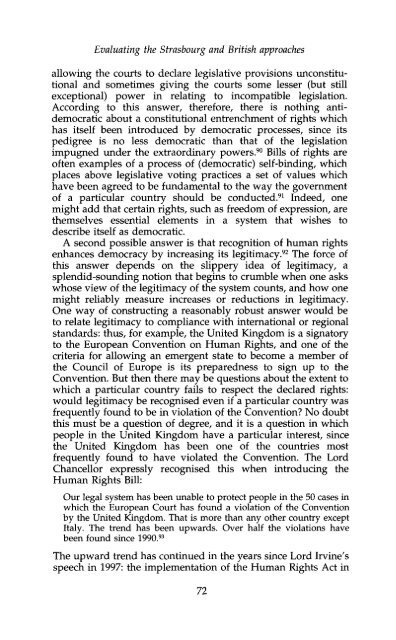Human Rights, Serious Crime and Criminal Procedure - College of ...
Human Rights, Serious Crime and Criminal Procedure - College of ...
Human Rights, Serious Crime and Criminal Procedure - College of ...
- No tags were found...
You also want an ePaper? Increase the reach of your titles
YUMPU automatically turns print PDFs into web optimized ePapers that Google loves.
Evaluating the Strasbourg <strong>and</strong> British approachesallowing the courts to declare legislative provisions unconstitutional<strong>and</strong> sometimes giving the courts some lesser (but stillexceptional) power in relating to incompatible legislation.According to this answer, therefore, there is nothing antidemocraticabout a constitutional entrenchment <strong>of</strong> rights whichhas itself been introduced by democratic processes, since itspedigree is no less democratic than that <strong>of</strong> the legislationimpugned under the extraordinary powers. 90 Bills <strong>of</strong> rights are<strong>of</strong>ten examples <strong>of</strong> a process <strong>of</strong> (democratic) self-binding, whichplaces above legislative voting practices a set <strong>of</strong> values whichhave been agreed to be fundamental to the way the government<strong>of</strong> a particular country should be conducted. 91 Indeed, onemight add that certain rights, such as freedom <strong>of</strong> expression, arethemselves essential elements in a system that wishes todescribe itself as democratic.A second possible answer is that recognition <strong>of</strong> human rightsenhances democracy by increasing its legitimacy. 92 The force <strong>of</strong>this answer depends on the slippery idea <strong>of</strong> legitimacy, asplendid-sounding notion that begins to crumble when one askswhose view <strong>of</strong> the legitimacy <strong>of</strong> the system counts, <strong>and</strong> how onemight reliably measure increases or reductions in legitimacy.One way <strong>of</strong> constructing a reasonably robust answer would beto relate legitimacy to compliance with international or regionalst<strong>and</strong>ards: thus, for example, the United Kingdom is a signatoryto the European Convention on <strong>Human</strong> <strong>Rights</strong>, <strong>and</strong> one <strong>of</strong> thecriteria for allowing an emergent state to become a member <strong>of</strong>the Council <strong>of</strong> Europe is its preparedness to sign up to theConvention. But then there may be questions about the extent towhich a particular country fails to respect the declared rights:would legitimacy be recognised even if a particular country wasfrequently found to be in violation <strong>of</strong> the Convention? No doubtthis must be a question <strong>of</strong> degree, <strong>and</strong> it is a question in whichpeople in the United Kingdom have a particular interest, sincethe United Kingdom has been one <strong>of</strong> the countries mostfrequently found to have violated the Convention. The LordChancellor expressly recognised this when introducing the<strong>Human</strong> <strong>Rights</strong> Bill:Our legal system has been unable to protect people in the 50 cases inwhich the European Court has found a violation <strong>of</strong> the Conventionby the United Kingdom. That is more than any other country exceptItaly. The trend has been upwards. Over half the violations havebeen found since 1990. 93The upward trend has continued in the years since Lord Irvine'sspeech in 1997: the implementation <strong>of</strong> the <strong>Human</strong> <strong>Rights</strong> Act in
















